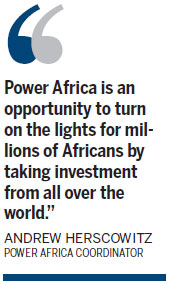Despite US promises, Africa waits for power
$7b pledge to provide electricity has produced next to nothing so far
US President Barack Obama told a cheering crowd last year in Cape Town, South Africa, that a $7 billion plan, Power Africa, would double electrical output on the world's poorest continent and bring "light where currently there is darkness".
A year later, the flagship project for Africa hasn't delivered any power, but according to an annual report, it has obtained pledges amounting to 25 percent of the goal: delivering 10,000 megawatts of electricity and bringing light to 20 million households and businesses.
Power Africa has not measured its progress in actual units of electricity added to the grid but by promises of additional power made in negotiated deals, according to sources inside the project and documents seen by Reuters.
Some projects facilitated by Power Africaa program operated by the US aid agency USAIDwere underway years before the plan's inception. Others are still in the planning stage.
It is unclear how much of Obama's $7 billion pledge has actually been spent, or whether a further $20 billion in private investment commitments will materialize.
"Saying you've met targets on projects that might never happen or taking the credit for projects that have been worked on for years makes me uncomfortable," a source working on Power Africa said. "It's misleading."
Obama's pledge to double power generation in Africa within five years looked highly ambitious from the start. Per capita electricity output in sub-Saharan Africa has been flat for three decades because most of the promised power plants never get built.
"We're dealing with megawatts on paper, rather than on the grid," a second source working on the project said. "Is that really what Obama promised?"
'Like a pharmacist'
The 48 countries of sub-Saharan Africa, with a combined population of 800 million, produce roughly the same amount of power as Spain, a country of 46 million. This constrains Africa's growth and keeps hundreds of millions in poverty.
Power Africa coordinator Andrew Herscowitz said there had been some confusion about the role of the program. He said it was always intended to "expedite transactions", facilitating private investment rather than handing out money.
Herscowitz said Power Africa was there to help the private sector deliver electricity and it had already negotiated commitments worth $20 billion from companies, although he did not know how much of this money had been received.

"We're like a pharmacist, where people come to us. We reach out to people and figure out what is needed," he said. "In some projects we may have a lot of involvement, and in some we have very little involvement."
Foreign companies sign billions of dollars of agreements with African governments for infrastructure projects every year, although a large number are never actually built.
In April 2011, the US Millennium Challenge Corp, a government aid agency involved in Power Africa, signed a $350 million deal to "revitalize" Malawi's power sector.
More than three years later, only 1.7 percent of that money has been spent, according to the program's website, which gives no details about progress on the ground.
Power Africa signed memorandums of understanding this year with its six focus countriesTanzania, Nigeria, Kenya, Ethiopia, Liberia and Ghana. They cover less than $100 million of the financial commitments targeted at specific countries, most of which is for consultants.
US consultancy Tetra Tech won a $64 million contract, and former British prime minister Tony Blair's Africa Governance Initiative was given a $3 million deal.
As with many African aid projects, rights groups have criticized Power Africa as being mostly a vehicle to subsidize US companies.
Documents show that $5 billion out of the $7 billion pledged is for loans for US exports from the government's Export-Import Bank and Overseas Private Investment Corp.
Turn on the lights
"It's absolutely not true. Power Africa is an opportunity to turn on the lights for millions of Africans by taking investment from all over the world," Herscowitz said.
Herscowitz rejected suggestions that Power Africa merely tapped into existing projects, highlighting a 5-megawatt "NextGen" solar project in Tanzania and a 30-megawatt biomass plan in Kenya that he said "didn't exist before Power Africa".
The NextGen project website, however, says a power purchase agreement for the solar project was signed in January 2013, six months before Power Africa was launched.
There is no guarantee that the Power Africa program, with an initial five-year mandate, will continue or be seen as a priority when Obama's final term ends in two years, US government sources told Reuters.
In addition, the investment banks are fighting for their survival in Congress, where the Democratic Party was severely weakened in midterm elections in November.
(China Daily 12/01/2014 page10)














